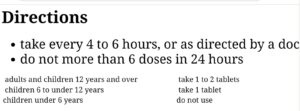Benadryl Dosing Guide – How Much and How Often Can I Take Benedryl?

If you have a common cold or allergic reactions, your doctor might recommend taking Benadryl. It is an over-the-counter drug that can ease the symptoms of hay fever, colds, and other allergies.
But how much Benadryl can you take and how often? This article will serve as your Benadryl dosing guide. Plus, you will also learn about Benadryl’s drug interactions and side effects.
What is Benadryl?
Benadryl is the brand name of the drug diphenhydramine. You will find “Benadryl Allergy” written on the label when you buy it from your pharmacist.
It is a common antihistamine used to treat symptoms of allergies and colds. It provides relief from several symptoms, including
- A runny nose
- Watery and red eyes
- Itching
- Hives
- Sneezing
- Nose irritation due to allergic rhinitis (a condition in which your nose gets irritated by something you are allergic to)
It also helps in the prevention and treatment of motion sickness and insomnia. Plus, it is also used to ease the symptoms of certain medical conditions. For example, Benadryl can control abnormal movements in patients of Parkinson’s disease.
Benadryl Ingredients
Diphenhydramine is the active ingredient in Benadryl. Each tablet contains 25mg of diphenhydramine HCl. You can also get it in other brand names like Banophen.
Diphenhydramine comes in different forms like tablets, capsules, and liquids. Your doctor may prescribe you any one depending on your needs and preferences.
Several other OTC drugs also contain diphenhydramine. Most of them are cough, cold, and flu medicines. So, make sure you always read the drug information label to keep track of your diphenhydramine intake.
How Does Benadryl Work in Allergic Reactions?
Benadryl is an antihistamine. It blocks the production of histamine in your body. Now, what is histamine? It is a substance solely responsible for allergic reactions in your body.
When your body produces too much histamine, you experience symptoms like itching, sneezing, and red eyes. Benadryl weakens or stops your body’s reaction to histamine. That reduces the symptoms of allergies.
How Often Can You Take Benadryl?
You can take a dose of Benadryl every 6 hours. Make sure your doses are spaced out. Otherwise, you might experience acute side effects.
Take the lowest effective dose (i.e. 25 mg) and space out the doses. That will prevent severe effects on your body.
How Much Benadryl Can You Take?
For mild seasonal allergies, you can take 25 to 50 mg of Benadryl every 4 to 6 hours. But 300 mg is the max amount of Benadryl you can take in 24 hours.
Children aged 6 to 11 years should not take more than 12.5 mg to 25 mg every 6 hours.
Follow the same dosage instructions if you are using Benadryl without a doctor’s prescription for motion sickness. Take the medicine around half an hour before the event that causes motion sickness.
If you have insomnia, you can take 25 to 50 mg of Benadryl 30 minutes before bedtime. The Benadryl for sleep dosage is the same that you take during allergies. But, using it regularly is not a good idea.
You should not give this medicine to children below 6 years old at any time. Even children below 12 years should only be given Benadryl for seasonal allergies.
How to Take “Benadryl Allergy” (Diphenhydramine)?
Take Benadryl according to the recommendations of your doctor. And if you are using it off-label, make sure you don’t take more than 50 mg every 6 hours.
Don’t take more than the recommended dose. It is also advisable not to continue taking Benadryl for a long time. You should discontinue use once your symptoms vanish.
You can also buy topical versions of Benadryl for rashes and skin irritation. Read the drug information on the label and apply it to the affected area to use it. That will give much-needed relief from pain and irritation.
Consult your doctor if the condition you are treating persists without any change.
Can You Take Benadryl While Pregnant or Breastfeeding?
It is safe to take small dosages of Benadryl during pregnancy. It doesn’t pose any risk to your fetus.
However, the drug passes into breast milk and may reduce your milk supply. Taking Benadryl while breastfeeding might also increase your child’s risk of side effects.
It is recommended to consult with your physician if you plan to take Benadryl during pregnancy or while breastfeeding.
Benadryl Dosing Guide – Is Benadryl Safe for Infants?

Source – FDA
Benadryl is not safe for infants. The active ingredient, diphenhydramine, is an antihistamine and can have dangerous side effects in children below 2 years old. It can lead to a rapid heartbeat and convulsions in infants. Thus, the drug could prove to be fatal for your child.
If your child is between 2 and 6 years old, you must talk to your doctor or pharmacist before giving any over-the-counter drug.
Children aged 6 to 12 years can take diphenhydramine. But you need to give them versions of the medication meant for children. They come in safe dosages and are also easier for your child to take.
Common Side Effects of Benadryl
Let us look at some common side effects of Benadryl.
- Blurry vision – It is a common side effect of this drug. Your vision might become blurry because diphenhydramine dries up your body.
Talk to your doctor if you have problems with your vision. They might recommend a different medicine. Also, make sure you don’t drive until your vision becomes normal.
- Fast heartbeat – You might experience shortness of breath and feel like your heart is racing.
Consult your doctor if you experience a rapid heartbeat when taking Benadryl.
- Memory loss or dementia – Older adults might develop this side effect due to prolonged intake of Benadryl.
Your doctor will ask you to stop the medicine if you experience memory loss.
- Dizziness – Dizziness is a common side effect of diphenhydramine. But, it can lead to several risks. For instance, driving a car can be fatal if you feel dizzy.
Caution is better than regret. So, make sure you don’t drive or operate any machinery after taking Benadryl.
The concerns increase as you age. Older adults and senior citizens above the age of 65 years are at a greater risk of experiencing side effects from Benadryl.
What Happens If You Overdose on Benadryl?
Data from studies on Benadryl use show that Benadryl is one of the most abused drugs in the United States. Taking too much of it can have deadly consequences. A 2016 study showed that 3.2% of drug overdose deaths are due to diphenhydramine.
Let’s see what happens when you take more than the recommended dose of diphenhydramine.
Benadryl Overdose Symptoms
Histamine receptors are present throughout the body. Thus, the effects of Benadryl can be severe since it is an antihistamine.
The medicine blocks the histamine receptors in your body. When it attaches to the histamine receptors of the brain, you experience the most severe effects.
You will feel tired and dizzy. The medicine will slow down your breathing and lower your blood pressure.
Very high doses can also affect your heart. It can lead to irregular heartbeats, which can be fatal at times.
What Should You Do When You Take Too Much Benadryl?
Contact your physician immediately if you feel you have taken too much diphenhydramine. Don’t delay if you feel extremely dizzy and experience irregular heartbeats.
You can also call 911 for support if someone takes too much Benadryl and experiences difficulty breathing or seizures.
Benadryl Dosing Guide – Confirm your Benadryl dosage with your pharmacist
This article has walked you through the Benadryl dosing guide. Take your medicines as directed by your doctor. You can also ask your pharmacist about the dosage of all your medications.
An experienced pharmacist will also tell you about the warnings associated with a medication. Hero Health Pharmacy has expert pharmacists to guide you leaving no room for confusion.
Talk to our experts and take charge of your health. You can also visit our website for more details.
Sources
- https://www.everydayhealth.com/drugs/benadryl
- https://www.rxlist.com/diphenhydramine/drugs-condition.htm
- https://carithersgroup.com/is-benadryl-safe-for-infants/ https://www.goodrx.com/diphenhydramine/benadryl-overdose
- https://www.healthline.com/health/drugs/benadryl-side-effects
- https://www.webmd.com/drugs/2/drug-5680/benadryl-oral/details
- https://www.drugs.com/medical-answers/how-much-benadryl-take-612467/




